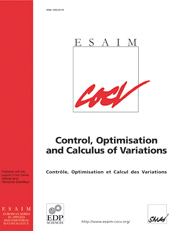Article contents
A nonsmooth optimisation approach for the stabilisationof time-delay systems
Published online by Cambridge University Press: 21 November 2007
Abstract
This paper is concerned with the stabilisation of linear time-delay systems by tuning a finite number of parameters. Such problems typically arise in thedesign of fixed-order controllers. As time-delay systems exhibit an infinite amount of characteristic roots, a full assignment of the spectrum is impossible. However, if the system is stabilisable for the given parameter set, stability can in principle always be achieved through minimising the real part of the rightmostcharacteristic root, or spectral abscissa, in function of the parameters to be tuned. In general, the spectral abscissa is a nonsmooth and nonconvex function, precludingthe use of standard optimisation methods. Instead, we use a recently developed bundle gradient optimisation algorithm which has already been successfully applied to fixed-order controller design problems for systems of ordinary differential equations. In dealing with systems of time-delay type, we extend the use of this algorithm toinfinite-dimensional systems. This is realised by combining the optimisation method with advanced numerical algorithms toefficiently and accurately compute the rightmost characteristic roots of such time-delay systems. Furthermore, the optimisation procedure is adapted, enabling it to perform a local stabilisation of a nonlinear time-delay system along a branch of steady state solutions. We illustrate the use of the algorithm by presenting results for some numerical examples.
- Type
- Research Article
- Information
- ESAIM: Control, Optimisation and Calculus of Variations , Volume 14 , Issue 3 , July 2008 , pp. 478 - 493
- Copyright
- © EDP Sciences, SMAI, 2007
References
- 73
- Cited by


